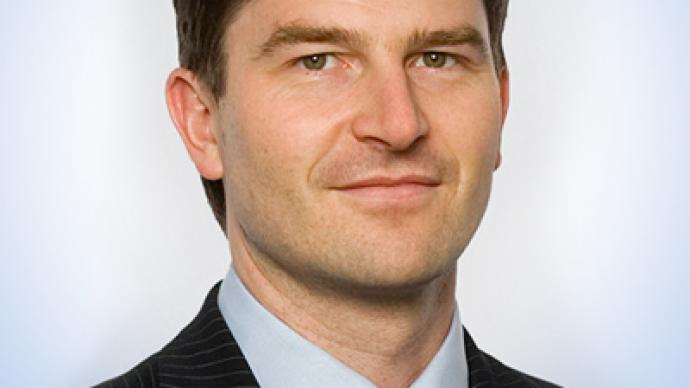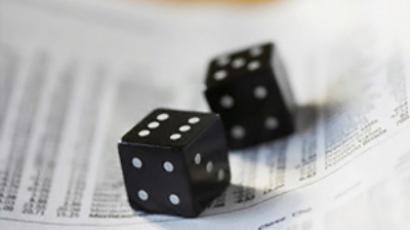Roland Nash: Moving on with Russian investment still the lure

Long term veteran of the Russian investment world, Roland Nash, has recently announced his departure from Renaissance Capital, to go to Verno Capital. He spoke with Business RT about the move and his thoughts on the Russian investment scene.
RT: As one of the longest term investment managers on the Russian scene, and more than a decade with Renaissance Capital, what new opportunities await you with Verno Capital?RN: “This is the opportunity for me to build my own management group. It’s an excellent platform, we have some of the most experienced traders in Russia working with us and a very good research team. And between them, I think, we’ll be able to offer the top quality specialists, access to CIS markets. My view is that the world is changing at the moment and we’ve got lots ofnew money looking at emerging markets – the money that used to be invested into the US or European countries. And there is a recognition that if you’re going to invest successfully into emerging markets, you need to have a specialists knowledge, particularly with the CIS countries, as this region seems to be misunderstood a lot. Now we already have a very strong and experienced team and traders in Verno Capital and that’s one of the main reasons I’m joining the company. ”RT: Does the move from Renaissance Capital reflect what has been seen in some quarters as a reduced focus on Russia from Rencap?RN: “Not at all. I’ve had fantastic 14 years in Renaissance and have never been bored. I’ve been one of the biggest supporters of taking the platform we build in Russia and moving into other markets. Renaissance Capital is probably a primary example of a Russian institution that has gone international. And the top quality institutions in Russia should be looking to expand into foreign markets, it should be internationally competitive.So, my move has nothing to do with the reduced focus on Russia.”RT: How well do you believe the Russian market is understood in comparison with other CIS nations?RN: “Russia is the major economy among CIS countries, it’s among one of the top 3 major emerging asset markets in the world – and that’s the most important. The Russian equity market and debt market are internationally important. Russia is still poorly understood internationally, but even given this Russia is the best researched and analyzed compared to such other CIS countries as Ukraine and Kazakhstan, for example. ”RT: Why should foreign investors be looking at Russia?RN: “Russia has all the elements that make a country attractive in today’s world. It’s the fast economic growth, compared to Europe and the USA. Secondly, whatever the perception is from outside, this country is developing really rapidly and has changed more that any other country during the last 10 or 20 years. Namely, the economy has completely transformed during this period. In 1998 it was a 100.5 billion dollar economy, now it’s a 1.5 trillion dollar economy. The service sector has become far bigger than it used to be, and unlike the situation 10 years ago now it’s a major sector of our economy. So, here in Russia you have fast growth, you’ve got lots of change, you’ve got a very liquid asset market – 3 of the top 10 most liquid universities in the emerging markets are there. And Russia is still very underleveraged, there’s not much borrowing in Russia, unlike the developed world. So, it has its own structural problems, but those are different from the ones that the rest of the world experience today. And though not being the only reason to invest into Russia, natural resources is a major reason for doing that. Now natural resources are in huge demand globally, with the world lacking them. And Russia is by far the largest producer of natural resources on the planet. And the final reason is that Russia is the largest consumer market and will remain such in Europe within the next decade. And if you put all these things together, you’ll see that Russia is a really interesting investment opportunity. Volatility is there and will remain for some time, but the level of opportunity is really attractive.”RT: Which sectors should foreign investors be looking at in Russia?RN: “I think, here you should be looking at 3 major factors. First is, which companies are really trying to take advantage of the situation, which of them has the management to improve their companies. You want to invest into the companies that are improving, not those that are good already now or are bad. And the primary example of that in the last 2 years has been Sberbank that has been through a lot of change. Also, there’s a big chance in the utility sector and Gazprom may be going through that transition as well. And if it does, it’ll offer a lot of value. The second interesting group includes Russian companies that have a proven track record of generating value with the shareholders. And the best examples here are a retailer Magnit, M. Video. And the 3rd area you want to be looking at is the companies that have the biggest exposure to the big changes that are happening at the moment. And in my opinion the latter include very low interest rates in the West and a lot of growth in general. And for me the real estate sector is really interesting – difficult to play but, I think, really attractive.”RT: How do you see the Russian economy performing in the coming year, and what do you believe will be the key drivers of that?RN: “I think, that Russia isn’t going to have stagnation – there will certainly be growth, with the only question reaming – how fast it’s going to be.Is Russia going to grow 3-4% in the medium term or it’s going to have a 5-6% growth. The difference between these two levels will determine how quickly Russia’s living standards rise. And Russia should have the same living standards as Western Europe. The reform programme in Russia will mostly influence which pace of growth Russia will follow. If Medvedev’s modernization programme can be pushed through, I see no reason why Russia shouldn’t follow 5-6% growth in the next couple of years. And if it isn’t, Russia will simply limp along at 3-4%. Will Russia’s privatization process be successful, will Russia get the access to the WTO, will there be lots of investment coming into the country’s infrastructure, will the budget deficit be tackled successfully, will banking reform be followed through, will the utility sector be successfully liberalized and successfully attract foreign investors? If Russia gets all these things right, I see no reason why Russia can’t reach a 5-6% economic growth in the medium term. If there’s not enough growth in any of those, it’ll be difficult for Russia to generate a sustainable growth in the mid term of 3-4%.RT: Which scenario is the most likely to take place? Do you expect Russia to grow 3-4% or, you think, it’ll reach a 5-6% economic growth during the coming 3-5 years?RN: I think, the determination is at the top of Government. We do have good reformers now sitting in the Government, who have a blueprint, a plan, how to do a lot of necessary reforms.Actually, it’s 50/50, as the plan is ready, the right people to implement that at the top are there, with the question of how this all is going to beimplemented through Russianbureaucracy remaining the biggest issue.”RT:How significant a driver for new investment flows do you see Russian accession to the WTO?RN: “I think, it’s very important and the question has been outstanding for many years. Actually, when I started to work here in Russia in 1994, I remember one of the first things I was told was that within the next 12 months Russia would be a member of the WTO. I think, now Russia is much closer to becoming the member than it has ever been before. There is really a political will to see Russia as a member of the WTO both internationally and in Russia itself. And it provides for a universally understandable legislative framework for trade between Russia and the rest of the world, which is really important, as it removes most of fears that exist about doing business in Russia.One of the biggest fears of foreign players investing into Russia is that legislation isn’t fixed. And what the WTO offers is the set of rules that would fix outside of Russia, the internationally accepted legislation, which, I think, will provide for a lot of comfort for foreign investors.”RT: What is your outlook for the other CIS nations?Which do you believe will outperform/underperform?What are the factors in that under/out performance?RN: “I think, that right now Ukraine has much more potential than people used to anticipate. Ukraine has had really difficult periods during the last 4 or 5 years. There was a lot of speculative capital that went into the country in 2006 and 2007. I mean, during the crisis it suffered more than any country within the CIS. But you should remember that at the centre of Europe the agricultural sector has a huge potential at the time when agriculture becomes a really great focus globally. And there should be a lot more political stability now than some 3 or years ago. The analogy might be the change from the Yeltsin Government to Putin’s regime. When Putin first came to power in 2000, there was a lot of skepticism about what he would be able to achieve. He came to power when Russia was a very volatile place. There is such a hope that Yanukovich in Ukraine can create that kind of stability to attract foreign investment. And if this happens, if they get the stability right, they can achieve the success.”













